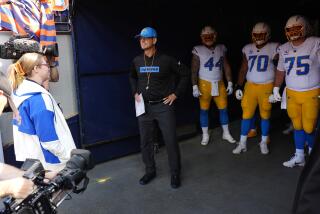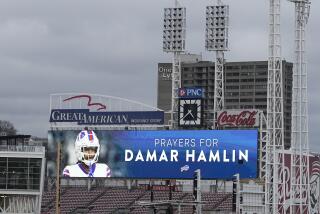Pro athletes are paid to play, not feel
WE MAY never know whether controversial Dallas Cowboy All-Pro Terrell Owensâ emergency room adventure was a result of attempted suicide or mismanaged meds. But the subsequent damage control has spoken volumes about the way top professional athletes have become little more than corporations with muscle tone, with images to be protected at all costs, their mental health a distant concern.
Attempting suicide is the ultimate cry for help. Yet in the world of jock culture, vulnerability equals weakness. Our superheroes arenât supposed to be lonely, depressed or absent hope. The mere hint that Owens might wrestle with suicidal tendencies damages the brand of Owens Inc. Itâs like finding out that your PC has a virus, or that thereâs E. coli at your favorite fast-food place.
And, like at a corporation, public outcry about the event became a PR crisis to manage. It was Owensâ flack, Kim Etheredge, who called 911, told police the star wide receiver was âdepressedâ and tried to pry two of the pain pills out of his mouth. Then she began spinning.
Less than 24 hours later, Etheredge was on camera soldiering for Owens Inc., saying a leaked police report was a fabrication and that âTerrell has 25 million reasons to be alive.â
Iâm still stunned by the ugliness of that statement. Twenty-five million is how many dollars Owens will be paid over the life of his three-year contract with the Cowboys. For Etheredge, Owensâ life must be worth no more than his pay scale. Presumably, if cut from the team, his âreasons to be aliveâ would dwindle to nothing.
Owens followed Etheredge at the news conference by stating explicitly, and with a sideways smirk, âI am not depressed.â In the stunted, backward world of jock culture, it is better to be seen as a dosage-miscalculating carnival distraction than someone burdened with the shame of depression.
As the self-described ârecovering sportswriterâ Robert Lipsyte wrote recently on tomsdispatch.com, âAthletes have been taught to appear invulnerable, to repress emotion, to never, ever let âem see you sweat, much less show panic or pain. This is why for so many pro athletes, with their shallow marriages, false friendships and dysfunctional family relationships, the only places where true emotion can freely emerge are the locker room and the playing field. There, they can finally hug and cry. For many, these are the only times they feel truly alive, and one can understand how they might be tempted to do anything to stay in the arena, including drugs.â
The stats back this up. As many as 80% of marriages involving male professional athletes end in divorce. Out-of-wedlock births are seen as so epidemic that rookies are given seminars on how to avoid being âtrapped.â Players feel paranoid, preyed upon and under the gun. Literally. Carrying a weapon is now so common that firearms guidelines are part of the NBAâs collective bargaining agreement.
For the athlete, this is a nation of enemies. The mantra becomes: separate, insulate and isolate. Gated communities and anabolic masses of bodyguards seal them off from all nonsexual human contact. But little is done to help players deal with the pressures that create this siege mentality. The message seems to be that pot, paternity suits and pistols are preferable to Prozac.
Long gone are the days when Willie Mays played stickball with neighborhood kids. Back then, being an athlete wasnât automatically a ticket to another universe.
And this ticket is being dangled earlier every year. As a fourth-grade teacher in Washington public schools, I saw what happened to the talented kids recruited to play in after-school leagues. They sported fancy uniforms, new shoes and other bells and whistles their parents couldnât possibly have afforded.
For the majority of kids, however, we didnât even have P.E., a budget casualty in the age of standardized tests. The message was clear: Some are special; others are not even worthy of dodgeball.
But even the âspecial onesâ became stunted by the experience. Most donât make it, and many who do see their dreams turn into nightmares. And as weâve seen with T.O, nightmares are a luxury the corporation cannot abide.
More to Read
Go beyond the scoreboard
Get the latest on L.A.'s teams in the daily Sports Report newsletter.
You may occasionally receive promotional content from the Los Angeles Times.










